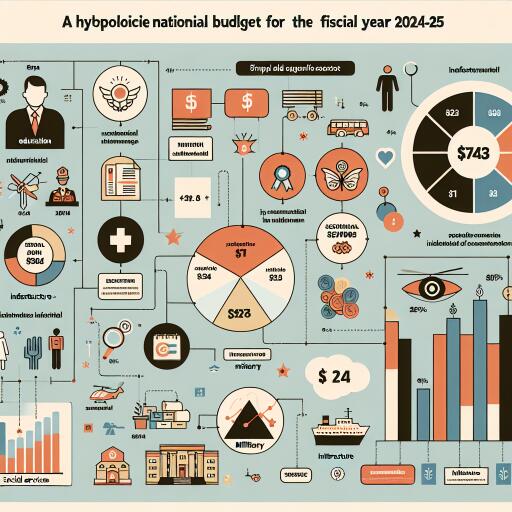
Budget 2024-25: An In-Depth Analysis
The latest financial blueprint for the year 2024-25 has been unveiled, projecting significant figures for expenditure and income, hinting at the economic strategies and priorities laid down for the upcoming fiscal year. The budget sets forth an expenditure plan amounting to Rs 118728 crore, with incremental adjustments from the previous year’s budget estimates of Rs 118500 crore for 2023-24. This modest increase underlines a cautious approach, possibly influenced by challenges in aligning actual incomes and expenditures with projected figures.
Evaluating Revenue Streams
The intricacies of the budget reveal a detailed income manifesto. Tax revenues from Jammu and Kashmir are projected to contribute Rs 20654 crore, constituting 17.39% of the total income. Non-tax revenues are expected to chip in another Rs 9661 crore or 8.13% of the total fiscal income, while a significant portion, amounting to Rs 56814 crore or 47.85%, is anticipated to be sourced from central grants. The strategy for bridging the gap includes an ambitious Rs 10732 crore from additional resource mobilization and borrowing of Rs 20867 crore, marking a cautious approach towards managing financial resources.
Dissecting Expenditure Priorities
Within the comprehensive expenditure plan, allocations signify a structured approach towards fiscal management. Salaries and pensions together amount to a significant portion of the expenditure, with Rs 31566 crore allocated for salaries and Rs 13651 crore for pensions. Other notable allocations include Rs 8017 crore for primary revenue expenditures and Rs 6500 crore earmarked for power purchase, indicative of the significant costs associated with maintaining and expanding infrastructure and administrative functionalities. Furthermore, Rs 4855 crore has been allocated as grants in aid, and another Rs 4435 crore will support the implementation of Central Sponsored Scheme (CSS) initiatives, reflecting the strategic emphasis on developmental projects and social welfare.
Investing in Development and Governance
A deeper look into the budget unveils a significant focus on developmental activities, with allocations made to empower local governance, and support initiatives in renewable energy, and infrastructure development. Notably, the budget earmarks Rs 1313 crore for enhancing decentralized governance, alongside significant investments in the hydropower sector, cooperative banking, and the flood management project for River Jhelum. Special allocations are also made for the development of rooftop solar projects, underscoring a commitment towards adopting renewable energy sources.
Debt Management and Economic Projections
The budget outlines a comprehensive plan for debt management, highlighting repayments and interest payments as critical components of financial planning. The meticulous allocation for these expenditures underscores the importance of maintaining a healthy balance between development aspirations and fiscal responsibility.
Reflections on the Current Fiscal Performance
Understanding the present fiscal year’s performance offers a glimpse into the challenges and accomplishments of budget execution. The year witnessed discrepancies between projected revenues and actual outcomes, particularly in tax and non-tax revenues, highlighting the complexities of economic management. Despite these challenges, the budget showcases a strategic allocation of resources aimed at sustaining growth, managing debts, and propelling development.
Prioritizing Development amidst Financial Constraints
While managing a budget of such magnitude, striking a balance between developmental needs and financial sustainability becomes paramount. The allocations reflect a concerted effort to invest in infrastructure, energy, and social welfare, despite financial constraints. The focus on renewable energy, in particular, signals a forward-thinking approach, aligning with global trends towards sustainability.
In conclusion, the budget for 2024-25 paints a picture of cautious optimism, with a balanced approach towards development, fiscal responsibility, and governance. As the financial year unfolds, the effective execution of these budget plans will play a critical role in determining the trajectory of growth and development for the region.





Leave a Reply